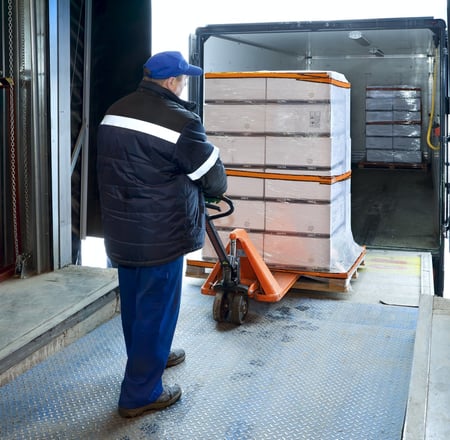Commercial fleet managers have to navigate a wide variety of responsibilities in their day-to-day business; from managing drivers and staff members to ensuring compliance with safety regulations, fleet managers wear many different hats. While it’s understandable for small things to slip through the cracks, these small things can impact daily commercial fleet operations. Keep reading to learn more about the most common fleet management mistakes, and tips to avoid them so your fleet can thrive.
Quick Links:
- Why Efficient Fleet Management Matters
- Top 5 Commercial Fleet Management Mistakes
- Best Practices for Common Commercial Fleet Management
- Invest in Quality Fleet Management Software Today!
Why Efficient Fleet Management Matters
Overseeing an efficient commercial vehicle fleet means there are numerous duties to perform: fleet managers are responsible for vehicle purchasing, scheduling vehicle maintenance, controlling fuel costs, developing safety programs, and more — all while trying to optimize efficiency and profitability within established budgets!
The logistics of managing a fleet can be highly complex. It’s essential to your company’s success that fleet management operations are as efficient as possible to ensure costly, frustrating mistakes rarely occur. This is why effective fleet management is critical to overall success: best practices can reduce financial cost, streamline operations, and ensure your fleet delivers top-quality!
Top 5 Commercial Fleet Management Mistakes
Let’s start with some of the most common fleet management mistakes, and dig into how they might be negatively impacting your commercial fleet operations.
Postponing Routine Maintenance
Postponing routine maintenance can cost you in the long run, due to breakdowns and downtime. When vehicles aren’t properly maintained on a routine basis, vehicles endure unnecessary wear and tear, which exacerbates minor repairs like oil changes or bad brakes. This means trips to the mechanic that could have been avoided but are now causing financial and operational strain to business.
Poor Communication
Communication is key in almost every aspect of life, and especially so in the world of commercial fleet management. Assuming your employees know more than they do can be a very costly assumption. When drivers don’t know how to operate new equipment or are not made aware of maintenance schedules, for example, such gaps in communication can result in dangerous situations or unspoken feedback about how to improve daily operations.
Overloading Trucks and Trucks
The slogan “if it fits, it ships” is fine for sending mail, but it shouldn’t apply to your fleet vehicle operations! Not only will your commercial vehicle experience excessive wear and tear by overweight loads, but it’s also dangerous for your driver and other drivers on the road. Overloaded vehicles can also cause you to replace tires and brakes more often than needed, adding unnecessary cost to already tight budgets.

Inefficient Route Planning
Inefficient routes waste fuel, time, and often lead to late deliveries. Not to mention, this is another factor in your commercial vehicles running through oil changes, brakes, and more preventative maintenance that could have been reduced by a more economized route. Your commercial vehicle drivers shouldn’t be wasting time by crisscrossing all over town to make deliveries on a route that could have followed a more logical path.
Not Investing in the Right Software
Refusing to embrace change or failing to come up with new solutions to keep your fleet running efficiently can mean that your fleet is doing the opposite. Not utilizing technology to your fleet’s advantage is likely resulting in money left on the table; with so many different types of vehicles, metrics to monitor, and reports to generate, the wrong software - or none at all - can, in fact, be adding more work to your daily responsibilities!
Best Practices for Common Commercial Fleet Management
Now let’s go through some tips to help optimize your commercial fleet and deliver the best service possible!
Schedule Regular Staff Meetings
Communication has to be a top priority for managers, so implement routine staff meetings involving the whole team to review goals, high-level items, company news, and more. Establishing a regular schedule of team-wide meetings will emphasize the importance of communication, and build team morale as you review how their work impacts the bigger picture of the company.
Be sure to also schedule one-on-one meetings between employees and their managers to encourage feedback and open communication. This will reflect the value you place in employees and empower them in their daily operations to note points of improvement or provide other feedback.
Organize Inventory
Inventory should be organized most logically and straightforwardly to ensure your commercial fleet drivers have a smooth transition from the loading dock to their routes. Be sure to use shelving racks, bins, and other apparatus that best fits the respective inventory pieces, and implement a labeling system were necessary to keep everything in its place.
Organizing inventory also means your commercial fleet vehicles should be best suited for their responsibilities. Sure, it’s cheaper to purchase smaller trucks or service vans to carry around equipment needed for jobs, but vehicles that are too small can lead to issues with overloaded cargo, too.
Schedule Preventative Maintenance
When the only thing you have to show for your fleet maintenance strategy is a bunch of receipts for repairs and replacement parts, then you need a new approach. Sticking to a schedule to organize when vehicles of your fleet need to be serviced will keep your paperwork organized and result in extending the longevity of your fleet. This means you get the most out of your commercial vehicles, which saves money and time!

Use Telematics for Efficient Route Planning
Inefficient routes waste precious resources and can result in vehicles needing maintenance sooner than if routes were economized. Utilizing telematics for planning the most efficient routes, monitoring driver progress, and making appropriate modifications can lead to significant fuel and time savings! It also means your commercial fleet drivers will be delivering the best, more efficient services to happy customers who’ll stay with you for the long haul.
Invest in Quality Fleet Management Software Today!
Rastrac is a global GPS fleet management leader who helps businesses get the most productivity out of their fleets for less money. Fleet managers worldwide trust Rastrac for their GPS tracking and asset tracking needs, and we are responsible for tracking more than $1.5 billion in assets.
To learn more about how a GPS fleet management system can make your fleet more efficient, check out our guide by clicking on the link below. Or, if you’d like to schedule a demo or get a quote, contact us today!
Like what you're reading? Subscribe to our blog.
Get our latest posts straight to your inbox.
Subscribe to Our Blog





